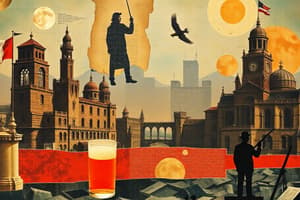Podcast
Questions and Answers
What is the largest category of literary works?
What is the largest category of literary works?
- Class
- Kind
- Genre (correct)
- Subgenre
The subgenre includes all types of literary works within a genre.
The subgenre includes all types of literary works within a genre.
True (A)
What are the two main ways we categorize literary works?
What are the two main ways we categorize literary works?
Based on contextual factors and formal textual features.
A particular kind of autobiography is called a ________.
A particular kind of autobiography is called a ________.
Match the literary terms with their definitions:
Match the literary terms with their definitions:
Which of the following is an example of a subgenre of fiction?
Which of the following is an example of a subgenre of fiction?
Literary classification terms are used rigorously and consistently.
Literary classification terms are used rigorously and consistently.
Nineteenth-century literature is an example of categorization based on ________ factors.
Nineteenth-century literature is an example of categorization based on ________ factors.
Which of the following is NOT a subgenre of narrative prose fiction?
Which of the following is NOT a subgenre of narrative prose fiction?
All narrative texts rely equally on dialogue and narration.
All narrative texts rely equally on dialogue and narration.
What are the key features uniting the various forms of prose fiction?
What are the key features uniting the various forms of prose fiction?
Poetry emphasizes the __________ and aesthetic qualities of language.
Poetry emphasizes the __________ and aesthetic qualities of language.
Match the following narrative forms with their descriptions:
Match the following narrative forms with their descriptions:
What is a primary characteristic of poetry?
What is a primary characteristic of poetry?
Narrative texts can include elements of nonfiction, such as memoirs and biographies.
Narrative texts can include elements of nonfiction, such as memoirs and biographies.
What is the typical length of a novella?
What is the typical length of a novella?
Which of the following works is attributed to William Langland?
Which of the following works is attributed to William Langland?
Sir Gawain and the Green Knight is a significant work from the Middle English period.
Sir Gawain and the Green Knight is a significant work from the Middle English period.
Name one important model for the short story that emerged from Middle English literature.
Name one important model for the short story that emerged from Middle English literature.
The English Renaissance is also referred to as the early new __________ period.
The English Renaissance is also referred to as the early new __________ period.
Match the following authors with their notable works:
Match the following authors with their notable works:
What genre indirectly influenced the development of the novel in the eighteenth century?
What genre indirectly influenced the development of the novel in the eighteenth century?
The Puritan interregnum had no impact on English literary history.
The Puritan interregnum had no impact on English literary history.
Which classical genres experienced a revival during the English Renaissance?
Which classical genres experienced a revival during the English Renaissance?
What characteristic distinguishes women's and minority literatures from avant-garde works of postmodernism in the 1980s?
What characteristic distinguishes women's and minority literatures from avant-garde works of postmodernism in the 1980s?
Post-colonial literature has become less important compared to avant-garde literature since the 1980s.
Post-colonial literature has become less important compared to avant-garde literature since the 1980s.
What is one region whose literature is included in the category of Commonwealth literature?
What is one region whose literature is included in the category of Commonwealth literature?
Literature written by marginalized groups is commonly referred to as __________ literature.
Literature written by marginalized groups is commonly referred to as __________ literature.
Match the literary movements with their characteristics:
Match the literary movements with their characteristics:
Which of the following best describes the trend in contemporary literature?
Which of the following best describes the trend in contemporary literature?
A single classification system can fully encompass all literary works.
A single classification system can fully encompass all literary works.
Name one of the factors that characterizes the approaches to literary texts.
Name one of the factors that characterizes the approaches to literary texts.
Which theoretical school primarily focuses on the author's biography?
Which theoretical school primarily focuses on the author's biography?
The text-oriented approach ignores the language and style of literary works.
The text-oriented approach ignores the language and style of literary works.
What is the main focus of reader-oriented approaches in literary studies?
What is the main focus of reader-oriented approaches in literary studies?
_________ theory seeks to connect literary texts with historical, social, or political developments.
_________ theory seeks to connect literary texts with historical, social, or political developments.
Match the following literary theories with their corresponding descriptions:
Match the following literary theories with their corresponding descriptions:
Which criticism critically evaluates the impact of literature on its readers?
Which criticism critically evaluates the impact of literature on its readers?
Comprehension and interpretation are the same in literary studies.
Comprehension and interpretation are the same in literary studies.
What is one key aspect of New Criticism?
What is one key aspect of New Criticism?
What philosophical approach emphasizes the lived experience of human beings as the source of meaning?
What philosophical approach emphasizes the lived experience of human beings as the source of meaning?
New Criticism primarily looks for the reader's personal experience in a literary text.
New Criticism primarily looks for the reader's personal experience in a literary text.
Who is the philosopher associated with the development of phenomenology?
Who is the philosopher associated with the development of phenomenology?
Phenomenology seeks to bypass the problem of separation between subject and object by focusing on the __________ reality of objects.
Phenomenology seeks to bypass the problem of separation between subject and object by focusing on the __________ reality of objects.
Match the following critical theories with their respective focus:
Match the following critical theories with their respective focus:
Which of the following is NOT a focus of New Criticism?
Which of the following is NOT a focus of New Criticism?
Reader-response criticism is a component of phenomenology.
Reader-response criticism is a component of phenomenology.
The __________ of reception is another reader-oriented version of phenomenology.
The __________ of reception is another reader-oriented version of phenomenology.
Flashcards
Biological Classification
Biological Classification
A system of categorizing organisms based on shared characteristics, starting with broad categories like kingdom and narrowing down to species.
Literary Classification
Literary Classification
The practice of grouping literary works based on shared features, such as form, style, subject matter, or historical context.
Genre
Genre
A broad category of literary works, encompassing fiction, poetry, and drama. It's the largest category in the classification of literature.
Subgenre
Subgenre
Signup and view all the flashcards
Kind
Kind
Signup and view all the flashcards
Bildungsroman
Bildungsroman
Signup and view all the flashcards
Epistolary novel
Epistolary novel
Signup and view all the flashcards
Memoir
Memoir
Signup and view all the flashcards
Narration
Narration
Signup and view all the flashcards
Short story
Short story
Signup and view all the flashcards
Novel
Novel
Signup and view all the flashcards
Novella
Novella
Signup and view all the flashcards
Poetry
Poetry
Signup and view all the flashcards
Poetic Communication
Poetic Communication
Signup and view all the flashcards
Nonfiction novel
Nonfiction novel
Signup and view all the flashcards
Prose Fiction
Prose Fiction
Signup and view all the flashcards
Middle English Period
Middle English Period
Signup and view all the flashcards
Romance (Literary Genre)
Romance (Literary Genre)
Signup and view all the flashcards
Narrative Cycle
Narrative Cycle
Signup and view all the flashcards
Mystery and Miracle Plays
Mystery and Miracle Plays
Signup and view all the flashcards
Elizabethan Age
Elizabethan Age
Signup and view all the flashcards
Revival of Classical Genres
Revival of Classical Genres
Signup and view all the flashcards
Puritan Interregnum
Puritan Interregnum
Signup and view all the flashcards
Romance (Literary Genre)
Romance (Literary Genre)
Signup and view all the flashcards
New Criticism
New Criticism
Signup and view all the flashcards
Phenomenology
Phenomenology
Signup and view all the flashcards
Reader-response criticism
Reader-response criticism
Signup and view all the flashcards
Aesthetics of reception
Aesthetics of reception
Signup and view all the flashcards
Women's and Minority Literatures
Women's and Minority Literatures
Signup and view all the flashcards
Postmodernism
Postmodernism
Signup and view all the flashcards
Literary Criticism
Literary Criticism
Signup and view all the flashcards
Modernism
Modernism
Signup and view all the flashcards
Postcolonial Literature
Postcolonial Literature
Signup and view all the flashcards
Traditional Narrative Techniques
Traditional Narrative Techniques
Signup and view all the flashcards
Content
Content
Signup and view all the flashcards
Academic Playfulness
Academic Playfulness
Signup and view all the flashcards
Literary Interpretation
Literary Interpretation
Signup and view all the flashcards
Author-oriented Criticism
Author-oriented Criticism
Signup and view all the flashcards
Reception Theory
Reception Theory
Signup and view all the flashcards
Contextual Approach
Contextual Approach
Signup and view all the flashcards
Formalism
Formalism
Signup and view all the flashcards
Comprehension vs. Interpretation
Comprehension vs. Interpretation
Signup and view all the flashcards
Comprehension
Comprehension
Signup and view all the flashcards
Study Notes
Course Information
- Course title: Commentary of Literary Texts in English
- Study guide unit: Approaching the Literary Texts in English
- Academic year: 2024-2025
- Degree: English Studies
- Language: English
- Coordinator: Adriana Kiczkowski
- Co-ordinators: Isabel Castelao and Inés Ordiz
Unit 1: Approaching Literary Texts in English
- Includes an introduction, discussion of what is literature, classifying literature, how to approach literary texts, critical theories and schools of criticism and resources.
- Includes a section on Terry Eagleton's literary theory.
- Also analyses literary genres, periods and literary movements.
- Provides theoretical approaches to literature, comprehension versus interpretation.
- Introduces different critical schools for literary analysis.
Studying That Suits You
Use AI to generate personalized quizzes and flashcards to suit your learning preferences.




